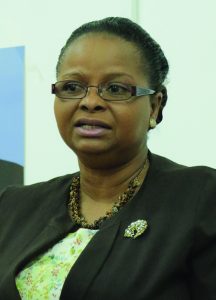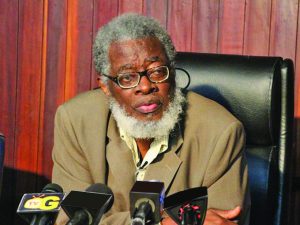$605M Pharma scandal update: GPHC’s CEO reportedly gamed bids for favoured company

Lawrence saved herself from answering some of the pertinent questions in relation to the controversial matter by claiming that the information would be provided in the report following the investigation into the $605 million contract to ANSA McAL.
In defending herself, the Minister said she wrote a letter to the newly-installed Board of the Georgetown Hospital ordering an investigation into the matter in light of the storm created on the issue by the media.

The investigation will seek to determine if or how the National Procurement and Tender Administration Board (NPTAB) was involved in the process, how the shortlisted companies were evaluated, if all the drugs were supplied by ANSA McAL on time, among other aspects.
Although ANSA McAL was awarded the contract in order to fast-track the supply of drugs, the Minister confirmed that not all of the drugs were delivered.
When asked, she disclosed that only a “large quantity” was delivered.
Meanwhile, other investigations have been launched into instances of delinquent suppliers.
“The Ministry is in the process of investigating several matters with regards of supply of various medicines and drugs,” she said.
In some cases, the investigations are engaging the attention of the Police. This publication was told that that several senior management staff including CEO Allan Johnson and Assistant Director Finance, Karen Cumberbatch are among those being investigated.
The Minister explained that on February 3, she called a meeting with the Directors and senior management, along with the Chief Executive Officer (CEO), of the Georgetown Hospital after she was informed of the drug shortage crisis.
She said there was a shortage of some 287 drugs for several reasons, including failure of the suppliers to provide the drugs they were contracted to supply.
“Some of them indicated inability to fulfil contractual arrangements. Suppliers supplied a few items and since indicated their inability to supply those drugs listed on the contract,” she said.
As a result, she instructed the Georgetown Public Hospital to review the shortlisted companies in order to have the drugs supplied in a timely manner.
Lawrence explained that she intervened because at the time, there was no Board in place at the Georgetown Hospital.
She explained that most entities have shortlisted contractors, whereby suppliers would apply on a yearly basis to be shortlisted as contractors.
But she was unaware if there was a difference between prequalified contractors and shortlisted contractors.
“We further discussed what would be the mechanism for us to fill that gap (shortage), since 2017 tenders have not gone out and even if they had gone out, the process and time span for the Hospital to begin to receive those drugs that it would take somewhere between six months for a turnaround in acquiring those drugs,” Lawrence explained.
The Minister said documents were prepared and four of the shortlisted companies “uplifted the documents, paid their monies and bid on the list of items”.
“Then I was called one morning indicating that there was a contract for ANSA McAL in the sum of $600 million…I wanted to know why ANSA McAL is being given that amount,” she said.
Upon inquiry, the Minister said the Georgetown Hospital CEO indicated that “this was the bid they had sent out and this is what they had responded to”.
Subsequently, the issue began to make headlines in the local dailies.
However, the Minister was unable to say what happened after she passed the instruction for companies to be shortlisted to fast-track the process.
“The Minister is not involved in the process; the Minister’s involved in declaring that there is an emergency and implement the mechanisms in place,” she explained.
Lawrence noted too that Cabinet was aware of the shortage of drugs but not that it was being awarded to ANSA McAL.
Moreover, the Minister disclosed that part of the reason the drug tenders were cancelled by the Georgetown Hospital was because suppliers said they were unable to supply the drugs.
“I met with suppliers and some of the suppliers indicated to me that they had issues with the quantities and what was within the lots which they bid on and received, and many of them had issues with the time in which they received their contracts and the turnaround of that,” she explained.
Meanwhile, the Minister did not address the issue that for the entire 2016, a similar method was used to procure medical/pharmaceutical supplies.
Management of the GPHC has been accused of deliberating creating an emergency situation in order to sole-source drugs from its preferred supplier. Within the last four months, it has cancelled or delayed four of its five public tenders, thereby creating a situation wherein there was a massive shortage of pharmaceuticals.
In a letter dated February 28, 2017, GPHC CEO Allan Johnson thanked the Public Health Minister for authorising the procurement of medical supplies from ANSA McAL to the tune of $605,962,200, even though local firms could have supplied the same quantity and quality of drugs at cheaper prices. Questions are now being raised regarding why these local firms had been sidelined. (Guyana Times)



